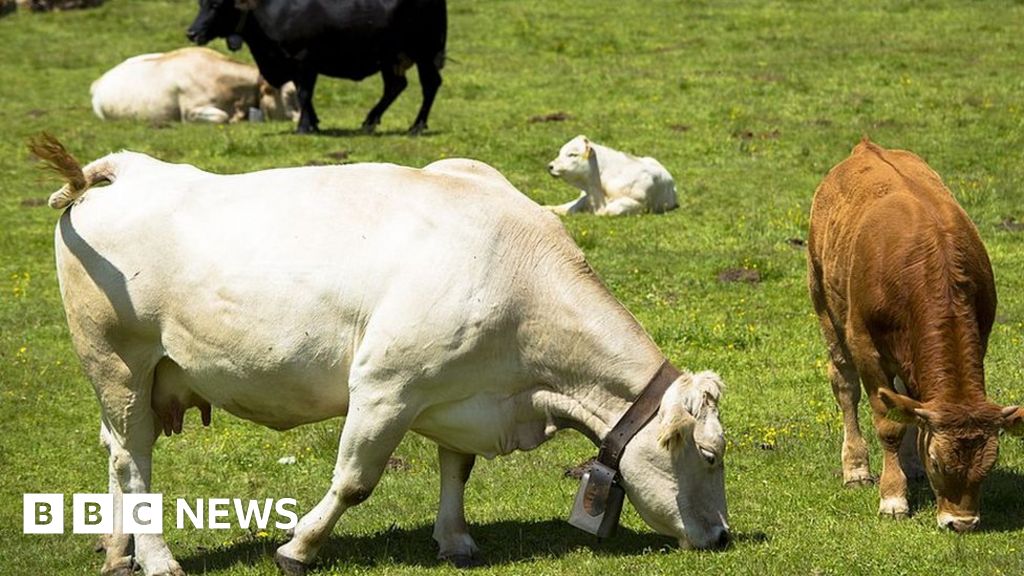- By Imogen Foulkes
- BBC News, Bern
Image source, Tim Graham/Getty Images
Swiss cows are now fitted with electronic chips so bells are no longer quite as important as they once were
The gentle tinkling of cowbells is a sound almost everyone associates with Switzerland.
It conjures up images of peaceful pastures, with majestic snow-capped mountains in the distance.
But what if those bells are right outside your bedroom window day and night, and rather than tinkle gently, clang loudly around the necks of 20 or 30 cows?
That is the dilemma many Swiss communities are facing.
Aarwangen, population 4,700, is a charming village sitting on the banks of the beautiful river Aare, the Bernese Alps in the distance.
It has a medieval castle and an attractive centre with a church and traditional farmhouses.
But the village is also strategically placed to serve Switzerland’s highly successful economy.
It is just an hour from Bern, Zurich, and Basel and is a lovely place to live for city workers who want some peace after the day job. Now, a growing number of new houses and apartments extend out from the village’s original centre.
But if you want complete quiet, Aarwangen, or anywhere in rural Switzerland, may not be for you. Those traditional farmhouses are still functioning, the green fields around the village are home not just to new houses, but to dairy cows, complete with bells around their necks.
For some of Aarwangen’s new residents, the din proved too much. At least two families complained formally to the village council, asking for the bells to be removed at night.
Howls of protest ensued. Long-term residents, and the village’s remaining farmers – just five or six according to village mayor Niklaus Lundsgaard-Hansen – were outraged at what they felt was an attack on their traditional culture.
The farmer who owned the herd in question viewed it as a “personal insult to him and his cows”, said the mayor.
Before long, in good Swiss tradition, a petition had been organised, gathering signatures for a vote to keep the bells because, it reads, “we, the Swiss [want to] preserve and maintain our lived traditions in the future”.
Andreas Baumann believes firmly that the bells are an essential part of the Swiss soul. He points to Zurich airport’s international terminal, where new arrivals are whisked to baggage pick-up through walkways with alpine scenes and the sound of cowbells.
“As soon as I hear them, I know I’m back home,” he said. Anyone disturbed by the bells had “too romantic a notion of rural life”, he argued, and should really live somewhere else.
Over 1,000 signatures were gathered for the petition in just a few days. They were handed over to the village authorities at a formal ceremony, accompanied by traditional sausages donated by the farmers.
Image source, Getty Images
Many see the bells as an important part of rural Swiss tradition
Cowbells were once very useful in Swiss rural life. With their herds, especially in summer, grazing high in the Alps and often on steep slopes, the bells were vital to keep track of them. Older farmers will still tell you they can hear each individual cow by the sound of its own bell.
But nowadays cows have electronic chips, and spend most of their time in fenced-off pastures. The row in Aarwangen is not the first over whether bells are really necessary.
Some Swiss farmers have already removed cowbells at night, so as not to disturb their neighbours’ sleep. Others have given up on them altogether. Animal rights activists have questioned whether the cows are harmed by having to wear a heavy noisy bell.
But in a country of high immigration, where 25% of the population is not Swiss, there will always be those who see any change to tradition as an attack on their culture and their identity.
That is really what Aarwangen’s cowbell row is about. In last month’s parliamentary elections the right-wing Swiss People’s Party campaigned on the slogan “so that Switzerland stays Switzerland”, and was rewarded with sizeable gains.
Next month, Aarwangen’s population will gather for a public meeting to vote on the future of their bells. In the meantime, perhaps shocked by the level of feeling, one of those who objected to the noise has withdrawn their complaint. The other has moved away.

Emily Foster is a globe-trotting journalist based in the UK. Her articles offer readers a global perspective on international events, exploring complex geopolitical issues and providing a nuanced view of the world’s most pressing challenges.








